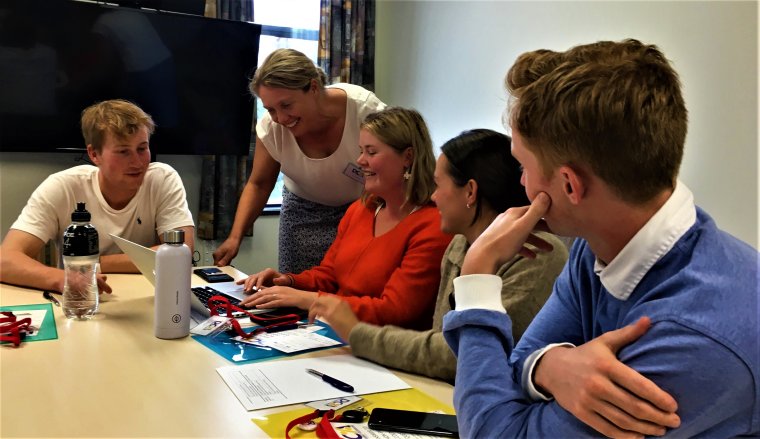Member Spotlight

March 2021
Dunedin Community Accounting
Photo and story by Angela Reid, Marketing Volunteer
The equation behind the Dunedin Community Accounting programme is simple:
Non-profit groups needing accounting advice
plus university accounting student volunteers
plus support from chartered accountant volunteers
equals a win-win situation for everyone involved.
And while numbers provide the practical focus of DCA, it is relationships and connections that lie at the heart of it.
”It’s trying to build that win-win relationship for people,” says Annette Harrex of Weave Together, the organisation running the programme.
DCA volunteer teams provide free accounting advice for non-profit organisations and Annette’s keen to let the city’s non-profits know they’re available now to help.
“We want to help you [the client]”, Annette says, ‘’but if you come along you’re helping us because you’re helping the students to grow and gain the skills that we want them to have.”
Those skills include life and people ones gained through meeting and hosting “real” clients, listening to them and building client relationships.
They’re skills the third-year plus students will need when they enter the job market, and the programme provides a valuable link to the real world of professional accounting by connecting them with qualified chartered accountants (CAs).
These volunteer CAs supervise the student teams and ensure quality control. But they’re also like mentors: they might talk to students about their course, equip them with employment strategies or provide insight into the practicalities of professional life.
The CAs enjoy meeting and talking with the students, Annette says, and she appreciates the different perspective each CA brings.
“So it’s just building those connections and relationships.”
She acknowledges some students are nervous when they enter the DCA experience and may be unsure of what to say or how to express themselves. But their CA, Weave Together staff and student team-mates are there to support them.
“Just having a group can help and they can learn off each other and throw those ideas around,” she says.
Another important relationship is that between the students and their client. The DCA programme gives these students their first experience with the non-profit sector and how these grass-roots organisations work.
And while some clients may get a quick-fix solution to the questions they bring to DCA, others may end up building a long-term relationship with the volunteer students.
“We’ve had clients come back two or three times because they need some help just getting routines and things established… [they want to know] ‘am I doing this right?’ And then they’ll go away and they’ll come back a month later and show them what they’ve done and get some feedback. ”
And no organisation, or question, is too small for DCA.
“We don’t mind the size of them [the client] at all. It’s like, the smaller the better sometimes because you can really get to know them and work with them and help them,” Annette says.
It’s these little guys of the non-profit sector that Annette especially wants to reach. Big non-profit organisations may have accountants on their board or professionals on hand to provide financial advice, she says.
“But sometimes these smaller ones are struggling to get that professional input into their organisation. So this is just a way of them accessing professional advice or support without having to pay for it.”
Annette’s aware many non-profits operate within small budgets, so accessing professional accounting advice is simply not feasible. And “it doesn’t matter whether you’re big or small, you still have to meet the same standards”.
DCA can help clients meet those standards and obligations. Volunteers can help with a range of topics, such as budgets, cash-handling, software, keeping records or financial or performance reporting.
Funding-related questions are common and there have been clients just starting their non-profit who want guidance on what they need to do and what to expect. (DCA is offering dedicated workshops on these topics too: the basics of non-profits in New Zealand will be covered on 21 April and a “funding from application to accountability” workshop is scheduled for 10 May.)
“Most of what we see is that lower-level good practice, just helping them get from that to the next step, or just navigating something that they haven’t seen before, that sort of thing,” Annette says.
However, DCA will not do audits or give tax or financial advice. For example: “We don’t say ‘this is what you should do with your money’.’’
A DCA client isn’t just another number to volunteers. The relationship is like a partnership, and collaboration is fundamental to the DCA experience – both within the volunteer teams who work together to find solutions and between the volunteers and their clients.
“It’s less of ‘you must do this’, it’s ‘can we show you?’ ‘can we help you?’”, Annette says. “It’s about building the capability of the organisation as much as it is the students.”
For instance, the volunteers might guide and help upskill a new club treasurer by introducing them to software that makes their job easier.
By providing free and easy access to accounting knowledge, the DCA programme aims to help “link everything together” for their clients, supporting them by adding their skills to the client’s own area of expertise: doing good for their community.
And whatever accounting questions they walk in the door with, non-profit clients can walk away from the DCA experience knowing it was about more than just getting the right answers.
“I think a lot of accountancy now is about relationship: getting to know them [the client], getting to know their business… helping them do what they want to do,” Annette says. “It’s not just all about numbers.”